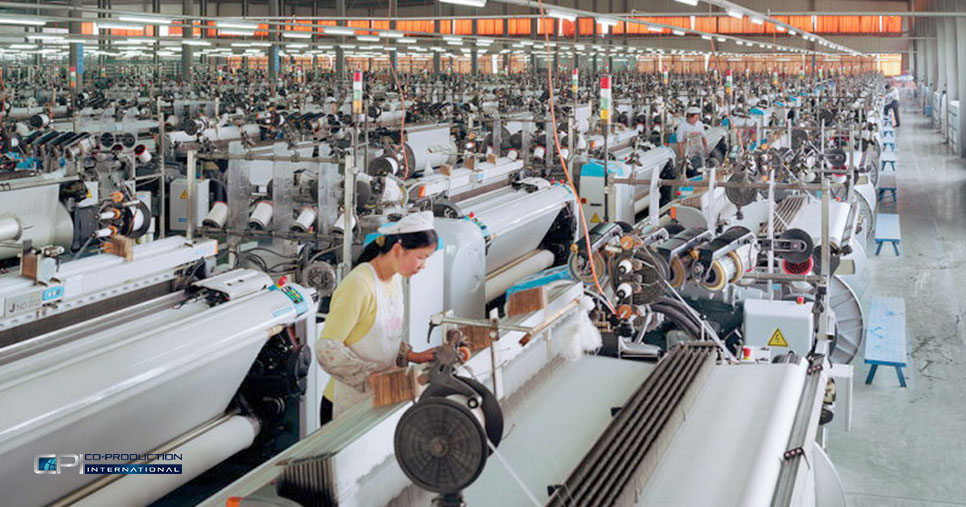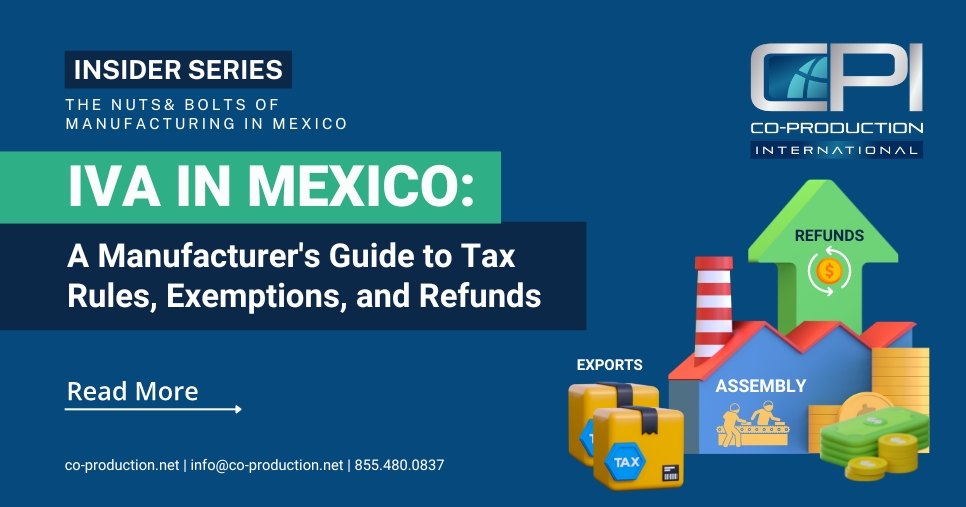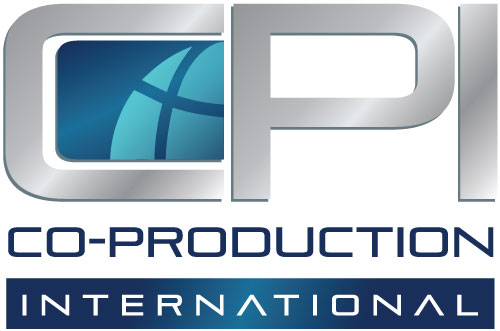Over a decade ago manufacturing companies wouldn't hesitate to say that China and other overseas manufacturing locations were hands-down cheaper than anywhere in the world. That is no longer the case. The trend has shifted for both political as well as economic reasons, and manufacturing in Mexico has arrived to the top of the short list.
Expanding, moving production to Mexico, or nearshoring as it's called, has now evolved from being a trend to a best practice. With Mexico manufacturng boasting over 50 years of experience, Co-Production International presents the following Top 10 Reasons for manufacturing in Mexico vs China.
1. Mexico Location is 46 Times Closer to Los Angeles than China
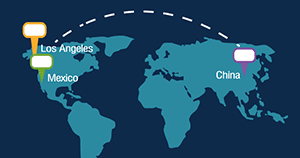
Mexico is the United States southern neighbor and it's US-Mexico border extends 1,954 miles (3,145 km) from San Diego to the Gulf of Mexico. The states of California and Baja California have created one of the top manufacturing hubs in the continent better known as the Cali-Baja Megaregion. The city of Tijuana is a key part of it boasting 50 years of manufacturing experience. It is strategically located just 140 miles from the major port of entry in Los Angeles/Long Beach. It's stones-throw proximity makes logistics less expensive and provides quick and easy access for US executives travelling to the region.
With major manufacturing hubs like Tijuana only minutes south of the US/Mexico border, moving parts and products couldn’t be easier. Major transportation highways and NAFTA corridors connect Mexico’s industry with major North American markets. Baja California’s deep-water port in Ensenada, just 60 miles south of San Diego, is connected to major ports in Los Angeles and Shanghai. Annually, there are 1.4 million commercial northbound crossings a year at the Otay Mesa commercial port of entry. Recent discussions have begun between governments to revitalize the cross-border railway between San Diego and Tijuana. (Mexico's Logistics & Infrastructure).
2. Tariffs and Duties
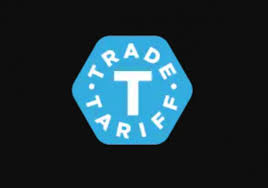 Over the last year the United States has been enveloped in a trade war with China manufacturing. Tariffs on hundreds of millions of dollars-worth of Chinese imports has created chaos for the metals, electronics, medical device, aerospace, agricultural and textile industries leading companies to revisit their business continuity plans. When profits can be nearly wiped out while your products and materials are on a 30-day boat from overseas, it’s time to think smarter. The United States has a long-standing and less adversarial trade relationship than it does with China and while not immune from dispute, sharing a continent and border and with each other encourages quick resolution and mutually beneficial compromise. Our industries and workforce are collaborative and complementary.
Over the last year the United States has been enveloped in a trade war with China manufacturing. Tariffs on hundreds of millions of dollars-worth of Chinese imports has created chaos for the metals, electronics, medical device, aerospace, agricultural and textile industries leading companies to revisit their business continuity plans. When profits can be nearly wiped out while your products and materials are on a 30-day boat from overseas, it’s time to think smarter. The United States has a long-standing and less adversarial trade relationship than it does with China and while not immune from dispute, sharing a continent and border and with each other encourages quick resolution and mutually beneficial compromise. Our industries and workforce are collaborative and complementary.
3. NAFTA/USMCA and Mexico's Pro-Business Environment
 Mexico has the most trade agreements of any country in the world and has twice as many as China. Mexico has 12 free trade agreements with 46 countries, with the North American Free Trade Agreement (NAFTA), now the United States-Mexico-Canada Agreement (USMCA) continuing to drive the country’s manufacturing industry. Though initially scrapped by US President Trump, the Trans-Pacific Partnership (TPP) was revitalized in January 2019 without participation from the United States and now includes six countries including Mexico. From no-tariff trade to duty free temporary imports for production through the IMMEX program, manufacturing in Mexico couldn’t feel any more like manufacturing onshore.
Mexico has the most trade agreements of any country in the world and has twice as many as China. Mexico has 12 free trade agreements with 46 countries, with the North American Free Trade Agreement (NAFTA), now the United States-Mexico-Canada Agreement (USMCA) continuing to drive the country’s manufacturing industry. Though initially scrapped by US President Trump, the Trans-Pacific Partnership (TPP) was revitalized in January 2019 without participation from the United States and now includes six countries including Mexico. From no-tariff trade to duty free temporary imports for production through the IMMEX program, manufacturing in Mexico couldn’t feel any more like manufacturing onshore.
4. Strong IP Protections Based on US and International Standards
 Mexico is regarded as having strong IP protections and enforcement compared to overseas competitors like China manufacturing. With intellectual property laws that were modeled after international standards set by the World Intellectual Property Organization (WIPO), Mexico's IP laws carry similar legal provisions for IP protection and enforcement as seen in the United States. The Mexican Patent and Trademark Office will cooperate with its counterparts in other countries to reduce the local examination process for patents that have already been registered in other countries.
Mexico is regarded as having strong IP protections and enforcement compared to overseas competitors like China manufacturing. With intellectual property laws that were modeled after international standards set by the World Intellectual Property Organization (WIPO), Mexico's IP laws carry similar legal provisions for IP protection and enforcement as seen in the United States. The Mexican Patent and Trademark Office will cooperate with its counterparts in other countries to reduce the local examination process for patents that have already been registered in other countries.
5. Mexico is Less Expensive Overall
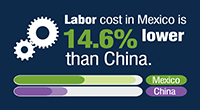 Not only is the Mexican labor force highly-skilled, but in 2012 reports show that Mexico labor rates are now lower than those in China in constant dollar terms, they are 14.6% less than China. Overseas manufacturing is no longer considered the "cheaper" alternative when it comes to production and assembly labor costs. When you factor in reduced logistics cost, Mexico has surpassed China in lowering overall costs for manufacturing.
Not only is the Mexican labor force highly-skilled, but in 2012 reports show that Mexico labor rates are now lower than those in China in constant dollar terms, they are 14.6% less than China. Overseas manufacturing is no longer considered the "cheaper" alternative when it comes to production and assembly labor costs. When you factor in reduced logistics cost, Mexico has surpassed China in lowering overall costs for manufacturing.
The average wage in Mexico for an entry level assembler is $2.50 dollars an hour, allowing your manufacturing operation to significantly reduce labor costs while still maintaining the same high-quality as you would at home.
Something else to consider is the hours an employee works per week, the US has a 40-hour work week and Mexico has a 48-hour work week, this will increase your production output by 16%.
6. Industrial Real Estate
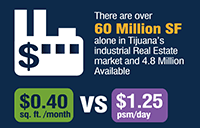 Mexico’s industrial real estate lease rates hover around $0.45/SF/month, whereas China’s lease rates average $5.77/psm/month. There are over 60 million square feet alone in Tijuana’s industrial real estate market, making the northern border metropolis an industrial real estate oasis. Many industrial complexes are structured around specific industries such as medical device, electronics, and aerospace and defense, offering not only space to lease but trade and logistics support. One example is the Thomas Alva Edison Industrial Park who just welcomed two medical device manufacturers such as Brentwood Industries with 35,000-square foot clean room, Phase 2 (Now Next Phase) with 30,000 sq ft clean room facility and ICON Aircraft with a built-to-suit facility of 300,000 sq ft.
Mexico’s industrial real estate lease rates hover around $0.45/SF/month, whereas China’s lease rates average $5.77/psm/month. There are over 60 million square feet alone in Tijuana’s industrial real estate market, making the northern border metropolis an industrial real estate oasis. Many industrial complexes are structured around specific industries such as medical device, electronics, and aerospace and defense, offering not only space to lease but trade and logistics support. One example is the Thomas Alva Edison Industrial Park who just welcomed two medical device manufacturers such as Brentwood Industries with 35,000-square foot clean room, Phase 2 (Now Next Phase) with 30,000 sq ft clean room facility and ICON Aircraft with a built-to-suit facility of 300,000 sq ft.
7. Mexico Graduates More Engineers A Year Than The US, Adding to the Bilingual-Bicultural Workforce
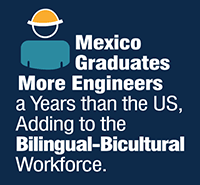
Mexico graduates 115,000 engineers a year, more than any other country on the continent, capturing 30% of the country's total university population. Baja California alone boasts 44 universities and 14 technical schools offering over 100 professional degrees. Partnerships between academia and government have helped spur development of industry-specific R&D centers such as the newly inaugurated CADTE center offering training in precision machining for aerospace and defense manufacturing. With a university-educated and technical-trained workforce, the electronics, medical device, aerospace and other high tech manufacturing industries find a labor pool that are up to the task.
Mexico's proximity and long history with the United States, executives find the Mexico labor force is largely bilingual and bi-cultural. Additionally, the US Dollar is the most frequent currency used in trade. With over 59 million annual north bound crossings from Tijuana, the region is not only bi-cultural, but deeply engrained with American customs. Executives find communication and business negotiations much easier than overseas countries.
8. Tijuana's $11 Billion Dollars in Industrial Supply Demand
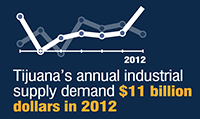
Are you missing out on a major market? Tijuana’s annual industrial supply topped $11 billion dollars in 2012. Not only is it less expensive to near shore operations for your own production, but mere proximity to major manufacturing clusters allows access to a whole new set of customers to supply to. Thousands of companies in Mexico need materials and supplies and is one of the market factors that draws manufacturers to the region.
9. Made in Mexico with US Parts
 Whereas products made in China are made up almost entirely of non-American parts (96%), products made in Mexico contain roughly 40% American-made parts. With major states like California, Texas, Michigan, Illinois and 16 other states, sell more than $1 billion dollars' worth of goods to Mexico every year (roughly 13% of all US exports.) Mexico and the US don't simply trade goods, but they work together to manufacturer them. US-Mexico trade is responsible for 6 million jobs in the United States.
Whereas products made in China are made up almost entirely of non-American parts (96%), products made in Mexico contain roughly 40% American-made parts. With major states like California, Texas, Michigan, Illinois and 16 other states, sell more than $1 billion dollars' worth of goods to Mexico every year (roughly 13% of all US exports.) Mexico and the US don't simply trade goods, but they work together to manufacturer them. US-Mexico trade is responsible for 6 million jobs in the United States.
10. The Power of The Cali-Baja Mega Region
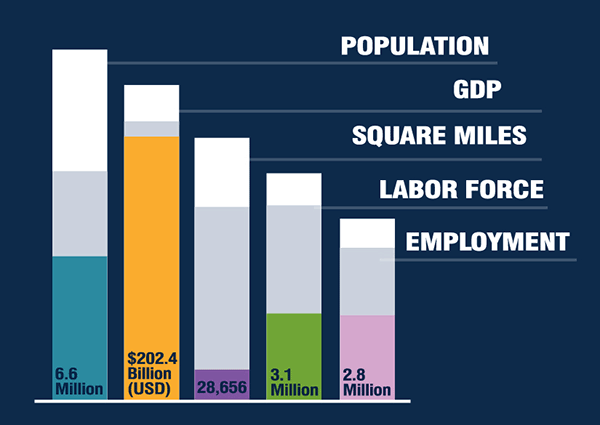
The Cali-Baja Mega Region encompasses San Diego County, Imperial County and the Mexican state of Baja California. With a GDP topping $255.2 billion dollars in 2017, the region supports electronics, aerospace, medical device, and automotive manufacturers. The Cali-Baja Mega Region boasts a highly skilled workforce, world class academic and applied research centers, proximity to major North American transportation corridors, and established and sophisticated industry clusters to support manufacturing activities. The Cali-Baja Mega Region’s power lies in its numbers:
- POPULATION 7.1 Million
- GDP $255.2 Billion (USD)
- SQUARE MILES 35,970
- LABOR FORCE 3.4 Million
- EMPLOYMENT 2.94 Million
Ready to take the first step to set up your Manufacturing Facility in Mexico? Request a free cost savings analysis!

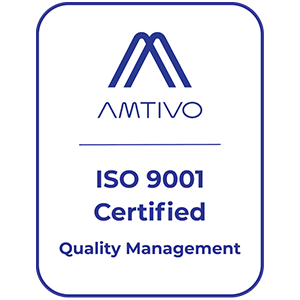


 Over the last year the United States has been enveloped in a trade war with China manufacturing. Tariffs on hundreds of millions of dollars-worth of Chinese imports has created chaos for the metals,
Over the last year the United States has been enveloped in a trade war with China manufacturing. Tariffs on hundreds of millions of dollars-worth of Chinese imports has created chaos for the metals,  Mexico has the most trade agreements of any country in the world and has twice as many as China. Mexico has 12 free trade agreements with 46 countries, with the
Mexico has the most trade agreements of any country in the world and has twice as many as China. Mexico has 12 free trade agreements with 46 countries, with the  Mexico is regarded as having strong IP protections and enforcement compared to overseas competitors like China manufacturing. With intellectual property laws that were modeled after international standards set by the
Mexico is regarded as having strong IP protections and enforcement compared to overseas competitors like China manufacturing. With intellectual property laws that were modeled after international standards set by the  Not only is the
Not only is the 


 Whereas products made in China are made up almost entirely of non-American parts (96%), products made in Mexico contain roughly 40% American-made parts. With major states like California, Texas, Michigan, Illinois and 16 other states, sell more than $1 billion dollars' worth of goods to Mexico every year (roughly 13% of all US exports.) Mexico and the US don't simply trade goods, but they work together to manufacturer them.
Whereas products made in China are made up almost entirely of non-American parts (96%), products made in Mexico contain roughly 40% American-made parts. With major states like California, Texas, Michigan, Illinois and 16 other states, sell more than $1 billion dollars' worth of goods to Mexico every year (roughly 13% of all US exports.) Mexico and the US don't simply trade goods, but they work together to manufacturer them. 

.png)
